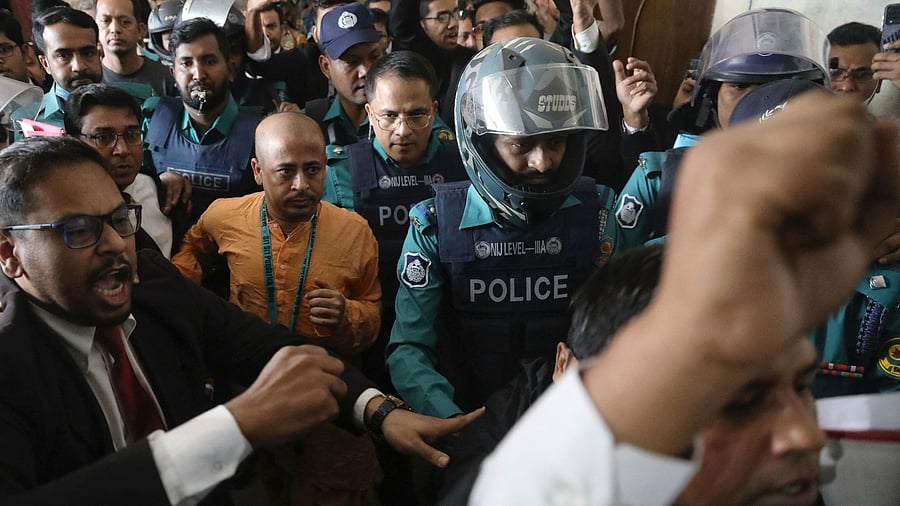
Chinmoy Krishna Das, a Hindu leader associated with the International Society for Krishna Consciousness (ISKCON), who faces several charges, is escorted by the police at the Chattogram Metropolitan Magistrate Court, in Chattogram, Bangladesh, November 26, 2024.
Credit: Reuters Photo
The arrest of Chinmoy Krishna Das, a leader of the Hindu minority in Bangladesh, on Tuesday, and the events leading up to the arrest and following it, have once again drawn attention to the challenges faced by minorities in the country. Das is a monk associated with ISKCON, and was arrested on charges of sedition after allegedly disrespecting the Bangladeshi flag. His supporters have denied the charge. The arrest led to protests across the country and a lawyer was killed in the clashes between the monk’s supporters and the police. Das has been denied bail. The Dhaka High Court has rejected a petition for a ban on the country chapter of ISKCON which said that it was a “radical organisation” involved in activities that threaten national security and stir up communal unrest. The government told the court that it had taken necessary actions and the court has asked the government to report on its actions.
The events have underlined not only the parlous state of law and order but also a sense of insecurity and anxieties that have gripped the minorities in Bangladesh. Minorities, mainly Hindus but also Buddhists and Christians, constitute about 10% of the country’s population. Though the Constitution promises them equality, they have frequently suffered oppression and violence. Politically uncertain times, especially times of change in government, have seen more such incidents and heightened tensions. Reports of mob attacks on Hindu homes and temples in August, when the Sheikh Hasina government was ousted, show that the pattern still holds. The attacks have continued since then. Fundamentalist Islamic organisations like the Jamaat-e-Islami have gained influence and hold positions in the government led by Muhammad Yunus. There were hundreds of attacks on Hindus and at least nine persons have been killed in the violence.
Muhammad Yunus has claimed that all such attacks are not communal and the situation has been exaggerated by the media. There could be a political angle to the attacks because Hindus have been identified with the ousted government. There may even be some motivated exaggeration in the accounts about the situation. But the overwhelming communal dimension cannot be denied. There was also a failure on the part of the Yunus government in protecting the lives and property of Hindus and instilling a sense of security in them. Hindu organisations like the Bangladesh Sommilito Sanatani Jagran Jote, which was part of the recent protests, have demanded speedy trials in cases of minority prosecutions and a minority protection law. The Indian government has expressed concern over the security of Hindus in Bangladesh. The Bangladesh government should address these and other international concerns and more importantly, the anxieties and demands of its minority population.
